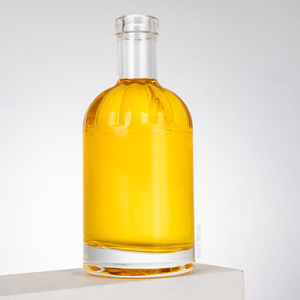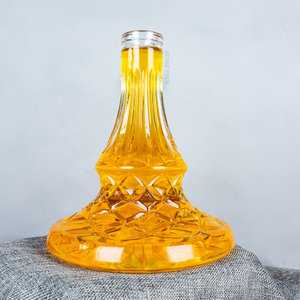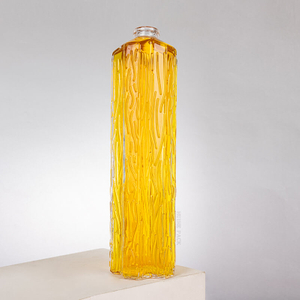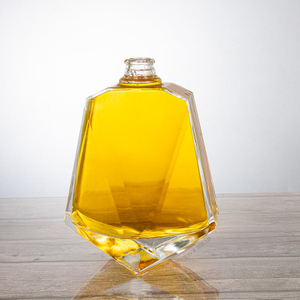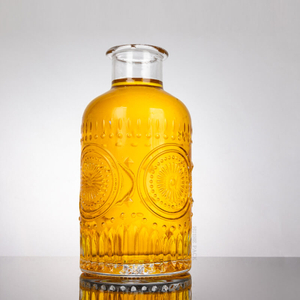Why we use cork as a liquor bottle cap?
Ever wondered why cork is still used to seal liquor bottles? The right closure can make or break the quality of your favorite spirits. In this post, we’ll explore why cork remains the preferred choice for liquor bottles, from its preservation benefits to its role in aging. You'll also learn about the advantages and challenges of using cork closures in the liquor industry.
![blog07-1-1 blog07-1-1]()
What is Cork and Where Does it Come From?
Cork is a natural material often used as a closure for liquor bottles. It's made from the bark of the cork oak tree, known scientifically as Quercus suber. This unique material has been a preferred choice in the packaging industry for centuries, thanks to its ability to preserve liquor quality and offer a premium aesthetic.
What is Cork Made of?
Cork can be categorized into natural and synthetic types.
Natural Cork: This is harvested from the cork oak tree, offering excellent elasticity and a unique ability to seal bottles effectively. Natural cork allows for slight oxygen exchange, which is essential for aging many types of liquor.
Synthetic Cork: Made from materials like plastic, synthetic cork is durable and provides a consistent seal. It is less likely to be affected by cork taint (TCA contamination) but lacks the same oxygen-exchanging properties as natural cork.
Cork’s material composition makes it both lightweight and resilient. It has an incredible elasticity that allows it to compress when inserted into a bottle neck and expand to create an airtight seal. This property is crucial for sealing liquor bottles while allowing just the right amount of oxygen to interact with the contents.
![blog07-1-2 blog07-1-2]()
Where Does Cork Come From?
Cork comes from the cork oak tree, which thrives in Mediterranean climates. The cork is harvested by stripping the bark of the tree without harming it, a process that can be repeated every 9 years.
Origin: The cork oak is primarily found in the Mediterranean region, particularly in Portugal and Spain, where the climate is ideal for these trees to grow. These two countries are the largest producers of cork globally, accounting for over 50% of the world's cork production.
Geographic Distribution: Other regions where cork oaks grow include parts of Italy, France, and Morocco. However, Portugal remains the leading exporter of cork products, known for its quality and sustainability.
The sustainable harvesting of cork ensures that these trees continue to thrive, making cork a renewable resource that is highly valued for its eco-friendly properties.
Benefits of Using Cork as a Liquor Bottle Cap
Cork has been a preferred material for liquor bottle closures for centuries. It offers unique advantages, from preserving the quality of liquor to enhancing its overall presentation.
Airtight Seal and Preservation
One of the most important benefits of cork is its ability to create an airtight seal.
Prevents Spoilage: Cork helps to tightly seal liquor bottles, preventing the entry of air that could cause spoilage. This is especially crucial for preserving the flavor and aroma of the spirit inside.
Preventing Oxidation: Oxidation occurs when oxygen interacts with the liquid, altering its taste. Corks prevent excessive oxygen exposure, preserving the liquor's flavor profile for longer periods.
Controlled Oxygen Exchange: Corks allow for a small amount of oxygen to interact with the liquor. This slight oxygen exposure is vital for aging spirits, as it helps to develop richer, more complex flavors over time. This feature is particularly beneficial for wines and aged whiskies.
Aesthetic Appeal and Premium Feel
Beyond functionality, cork closures also have significant aesthetic value.
Why Cork is Associated with Premium Spirits: Cork is often associated with high-end liquor brands due to its classic and luxurious appearance. It gives the bottle a sense of sophistication that plastic or metal closures can't replicate.
Traditional and Classic Look: Many consumers view cork as the traditional choice for fine spirits. Its rustic, natural appeal enhances the overall perception of quality, making it a popular choice for premium brands in the liquor industry.
By combining a strong seal with aesthetic appeal, cork closures help preserve both the integrity and the presentation of the liquor inside.
![blog07-1-3 blog07-1-3]()
How Does Cork Affect the Aging Process of Liquor?
Cork plays a significant role in the aging process of liquor, particularly wines and spirits like whiskey. The unique properties of cork allow it to interact with the contents inside the bottle in ways other closures cannot.
Controlled Oxygen Exchange and Aging
Tiny Amount of Oxygen: Corks allow just a small amount of oxygen to pass through. This tiny bit of oxygen is essential for the aging process, as it triggers chemical reactions that develop the flavors of the liquor over time.
Benefits of Oxygen Exposure: The limited oxygen exposure helps enhance the complexity of flavors. Over the years, oxygen interacts with the liquid, softening harsh notes and allowing richer, more intricate tastes to emerge. This is why many spirits, like whiskey, improve as they age in the bottle.
Particularly Beneficial for Wines and Aged Spirits: For wines, especially reds, this controlled oxygen flow helps the wine mature and mellow. The same applies to whiskey and other aged spirits. The longer they sit with cork, the more they develop, creating a smooth, balanced taste that drinkers seek in premium products.
This process, facilitated by cork, is one of the reasons why certain spirits, like fine wine and aged whiskey, are highly valued.
Types of Cork Closures Used for Liquor Bottles
Cork closures come in several types, each offering unique benefits depending on the product and brand. From natural cork to synthetic and innovative alternatives, each has its own role in preserving liquor quality and appearance.
Natural Cork
Characteristics: Natural cork is made from the bark of cork oak trees, offering flexibility and a natural seal. It is highly breathable, allowing a small amount of oxygen to pass through, which is beneficial for aging certain spirits.
Benefits: Natural cork is preferred for its high quality and traditional look. It creates an effective seal and allows liquor to mature gracefully, enhancing the flavor over time. This is especially true for wines and aged spirits like whiskey.
Disadvantages: Despite its benefits, natural cork can be prone to issues like cork taint (TCA contamination), which can affect the flavor. It is also more expensive and can dry out or crumble if not stored properly.
Synthetic Cork
Advantages: Synthetic corks are made from plastic compounds designed to mimic natural cork’s sealing properties. They are durable, consistent, and less likely to suffer from cork taint, ensuring a more reliable seal.
Why It’s Gaining Popularity: Due to their affordability and reliability, synthetic corks are becoming more popular, especially for less expensive spirits. They are also easier to produce and provide a consistent seal, reducing potential quality issues.
Alternative Cork Closures
Glass Corks: These closures are made from glass and provide an airtight seal similar to traditional cork. They offer a sleek, modern look but are less common due to higher production costs.
Screw Caps: Although typically associated with wine, screw caps are also used in the liquor industry, especially for products that do not require aging. They provide a tight seal but lack the oxygen exchange benefits of cork.
Smart Corks: A new innovation in cork closures, smart corks are equipped with sensors to track temperature, humidity, and tampering. These advanced caps offer added security and ensure that the liquor remains in optimal conditions throughout its shelf life.
![blog07-1-4 blog07-1-4]()
Potential Issues with Cork as a Liquor Bottle Closure
While cork closures have many advantages, they do come with some potential issues. These problems can affect the quality of the liquor inside the bottle and even alter the drinking experience.
Cork Taint
What is Cork Taint?: Cork taint occurs when the cork is contaminated with TCA (2,4,6-trichloroanisole), a compound that imparts a musty, unpleasant smell and taste to the liquor. This can ruin the flavor and overall quality of the spirit, making it undrinkable.
How to Avoid Cork Taint: While cork taint is more common in natural corks, it can still occur with synthetic corks. Choosing corks from trusted suppliers and ensuring proper storage can help reduce the risk. Synthetic corks are less prone to TCA contamination, making them a reliable alternative for preventing this issue.
Drying Out and Breakage
Drying Out Over Time: Cork is a natural material, and over time, it can dry out and lose its elasticity. This affects its ability to form a tight seal, potentially allowing air to enter the bottle. When this happens, the liquor can spoil or oxidize, changing its flavor.
How to Prevent Drying Out: Storing liquor bottles correctly is key. To prevent corks from drying out, bottles should be stored on their sides in a cool, dark place. This keeps the cork moist, helping maintain its sealing ability for longer periods.
Cork Fragments in Whiskey Bottles
Breakage of Dried Cork: In some cases, especially with whiskey bottles, corks can break into small pieces when opened. This often happens when the cork has dried out or aged improperly. The cork fragments can fall into the liquor, causing a less-than-pleasant experience.
Impact on Quality: Cork fragments can interfere with the drinking experience, affecting both taste and presentation. For whiskey drinkers, it’s especially frustrating when cork pieces float in the bottle, ruining the integrity of the spirit.
Proper cork storage and handling can reduce the likelihood of these issues, ensuring the liquor inside remains fresh and enjoyable.
Technological Advancements in Cork Closures
Cork closures have evolved over the years, with modern innovations offering enhanced protection and convenience. From smart technology to UV light caps, these advancements are changing how liquor bottles are sealed, ensuring the quality and integrity of the contents.
Smart Caps
What Are Smart Caps?: Smart caps are high-tech bottle closures that are equipped with sensors. These sensors can monitor key factors like temperature, humidity, and even tampering. The data is often stored in the cap or transmitted to a connected device, allowing for real-time monitoring.
Ensuring Liquor Quality: Smart caps play a vital role in maintaining liquor quality. By tracking temperature and humidity, they help ensure the storage environment is optimal. If the conditions change—such as a rise in temperature, which could spoil the liquor—the cap can alert the manufacturer or consumer.
UV Light Caps
Impact of UV Exposure on Liquor: Exposure to UV rays can degrade the quality of liquor, especially spirits like whiskey and wine. UV light can cause the liquor to lose its flavor and aroma, negatively affecting its taste and overall quality.
How UV Light Caps Help: UV light caps are designed to protect liquor from harmful UV rays by blocking or absorbing the light. These caps keep the bottle sealed while offering extra protection, ensuring the liquor remains fresh for a longer period.
Preserving Flavor During Transport: UV light caps are particularly beneficial for liquor bottles during transport, where exposure to sunlight or artificial light could otherwise degrade the quality. With these caps, liquor stays protected, maintaining its flavor and integrity throughout its journey from production to consumption.
These technological advancements are ensuring that modern cork closures do much more than just seal a bottle. They play a key role in protecting the quality and extending the shelf life of liquor.
![blog07-1-5 blog07-1-5]()
The Growing Popularity of Eco-Friendly Cork Closures
As environmental concerns continue to rise, eco-friendly cork closures are becoming increasingly popular. Consumers are demanding packaging that is not only functional but also sustainable, leading to innovations in cork materials and closures.
Biodegradable Corks
Sustainability of Biodegradable Corks: Biodegradable corks are made from natural cork, which decomposes over time. This makes them a more environmentally friendly option compared to synthetic materials. Cork is a renewable resource, as the cork oak trees can be harvested every 9 years without harming the tree, allowing it to continue growing.
Growing Consumer Demand: More and more consumers are looking for eco-friendly products. As awareness of environmental issues increases, people are choosing brands that offer sustainable packaging. Biodegradable corks meet this demand by offering a product that reduces environmental impact.
Renewable, Recyclable, and Biodegradable: Cork is not only renewable but also recyclable and biodegradable. This makes it an ideal choice for environmentally conscious consumers and brands. Using cork closures helps reduce waste and supports a circular economy.
Recyclable Materials
Recyclable Cork and Other Materials: Cork closures can be recycled, making them a part of the growing movement towards sustainable packaging. Other materials, like glass and aluminum, are also being used in closures, contributing to more sustainable packaging solutions in the liquor industry.
Shift Toward Sustainability: The liquor packaging industry is increasingly moving towards sustainability. More brands are opting for recyclable and eco-friendly materials to meet consumer demands. This shift is helping to reduce the carbon footprint of the industry while providing consumers with environmentally responsible choices.
With the rise in eco-consciousness, cork closures are playing a key role in making liquor packaging more sustainable.
![blog07-1-6 blog07-1-6]()
Why Do We Still Use Cork for Liquor Bottles?
Despite the availability of newer materials, cork remains the go-to choice for sealing liquor bottles. Its longevity and unique qualities have made it a staple in the industry, particularly for premium brands.
The Longevity of Cork
Cork has stood the test of time as a reliable material for sealing liquor bottles. It’s durable, flexible, and capable of maintaining a tight seal for extended periods. These qualities make it an ideal choice for both aging spirits like wine and whiskey and for preserving the freshness of other liquors.
The Importance of Tradition
In the liquor industry, tradition plays a significant role, especially for premium brands. Cork closures are seen as part of the heritage, often symbolizing quality and craftsmanship. For many high-end liquor brands, using cork is not just about function, but also about preserving a classic image that customers trust.
Consumer Preference for Cork
Consumers often associate cork with luxury and tradition. Its classic appearance enhances the perception of a product’s quality, making it more appealing to those who value craftsmanship. Many buyers continue to prefer cork closures, especially for premium spirits, as it reflects the authenticity and excellence they seek in their beverages.
Cork’s lasting appeal is more than just practical—it’s a symbol of quality that continues to resonate with consumers worldwide.
Cork vs. Other Liquor Bottle Closures: A Comparison
Cork closures are a popular choice for liquor bottles, but they are not the only option. Let’s take a look at how cork compares to screw caps and crown caps, which are used in other types of beverage packaging.
Screw Caps
Sealing Ability and Aging: Cork provides a better seal for aging liquor due to its ability to allow a small amount of oxygen to enter the bottle. This controlled oxygen exchange is essential for the maturation of wines and spirits like whiskey. Screw caps, on the other hand, provide an airtight seal, which prevents any oxygen from entering. This is perfect for preserving the freshness of wine and spirits that aren't meant for aging but less suitable for those that need aging.
Growing Popularity: Screw caps are gaining popularity for wines and spirits that are intended for immediate consumption, such as young wines or certain liquors. They are easy to use, affordable, and ensure that the product stays fresh, making them ideal for quick turnover products.
Crown Caps
Use in Other Beverages: Crown caps are commonly seen on beer bottles and are also used for certain sparkling wines. Their tight seal prevents any carbonation from escaping, which is crucial for beverages like beer or soda.
Pros and Cons for Liquor Bottles: While crown caps offer consistent sealing, they have a major downside when it comes to aging liquor. They don’t allow any oxygen exchange, which can lead to a lack of maturation for spirits that benefit from aging. They are durable and cost-effective but aren’t suitable for liquors that need to develop complex flavors over time.
Cork, screw caps, and crown caps each have their strengths and weaknesses depending on the type of liquor being bottled and whether aging is a part of the process.
![blog07-1-7 blog07-1-7]()
Conclusion
Cork remains the top choice for liquor bottles due to its reliable seal and ability to age liquor. It preserves flavor, prevents spoilage, and adds a premium touch. As consumer demand grows for eco-friendly options, cork's renewable and biodegradable properties are becoming even more valued. With advancements in smart caps and UV light protection, the future of liquor closures looks promising.
If you have any questions about liquor bottle closures or want expert advice on choosing the right sealing solution, feel free to contact our professional team—we’re here to help.
FAQ Section
Q1: Can you reuse cork closures for liquor bottles?
A: Reusing cork closures is generally not recommended, as the cork may lose its sealing ability and introduce air that could spoil the liquor.
Q2: Are synthetic corks better than natural corks for liquor bottles?
A: Synthetic corks are less prone to cork taint and provide a consistent seal, but they don’t allow for the aging benefits of natural cork.
Q3: What types of liquor are best aged with cork closures?
A: Wines, particularly red wines, and aged spirits like whiskey benefit most from cork closures due to their ability to allow controlled oxygen exchange.
Q4: Do cork closures affect the taste of the liquor?
A: Yes, cork closures can influence the taste by allowing a small amount of oxygen, which enhances the aging process and flavor development.
























